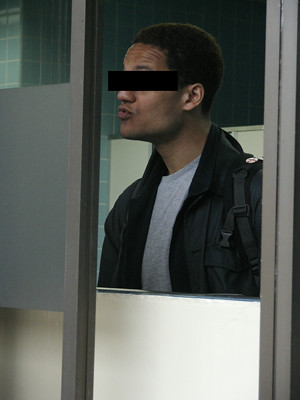When you work as an
ESL teacher
in Japan, you tend to face a lot of the same questions again and again. Part of it has to do with the level of the language skills you're dealing with. If all you know is the present tense, your questions will naturally be limited to immediate lines of thought.
"Do you like Soccer?"
"Do you like strawberry?"
"Are you a college student?
"Do you like Japan?
Lots of yes/no questions. And thanks to a rather puzzling textbook choice, they don't learn all the
interrogative words until age 14. So you can finally get gems like:
"How old are you?"
"Where do you live?"
"How tall are you?"
"Why did you come to Japan?"
Of course, thanks to the
drill-repeat-drill-repeat and memorize-regurgitate teaching methods favored for language education here, by the time they get to the interrogative words the kids have largely burned
do you like into their brains as a single, indivisible unit. Which means you also variations on the following theme.
"What do you like sports?"
"What do you like Japan?"
"Do you like food, what?"
"Who do you like school's cute teacher?"
In general, this has very little to do with what I'm used to as communication. It's not bad for people raised on TV interviews and magazine profiles, and given that it's usually teenagers and pre-teens coming up with these, I might even say they were doing all right. But there really isn almost no emphasis on comprehending the response and using it to continue the conversation. My adult students actually have to be trained how to ask follow-up questions, and textbooks often include formulas that looks something like
"Really? What about [previous answer] did you like best?"
"Oh? What kind of [previous answer] is your favorite?"
and my personal favorite
"I don't know much about [previous answer]. Please tell me more."
But that's really only attempted by the more advanced students. Most people peak out at "I like [blank.] What do you like [blank]?" Which is why what happened last week was such a treat. I had to conduct speaking tests for the 9th graders here. All 211 of them, at around 7 minutes per test. Of itself, that was no treat. And the vast majority of the answers were entirely adequate for people with a minimal command of an illogical lanugage taught with an emphasis on rote memorization in an educational system that discourages abstract thought.
What did happen was that more of the students than I could have hoped for asked questions that indicated they'd been paying attention to earlier replies. I must admit that I was flattered when some students made a point to ask me about eating ramen, reading comic books or playing video games, because they remembered my introduction in class. And when they actually had their own opinions about whether
Final Fantasy or
Dragon Warrior was a better game, why
Kamen Rider was a better hero than any of the
Power Rangers, or what was most surprising thing they'd ever seen on the TV show
Fountain of Trivia, well, I was quite satisfied.
And a few, a rare, precious few, actually gave smart-ass answers. One of the questions they had to answer what "what will you do if [
teacher's name] comes to your house?" And while most said they would speak English or study history or something, a very few had the backbone to say things like
- "Lock the door."
- "From the, back door, run fast."
- "Not open front door and windows."
and my personal favorite,
- "Throw many many stones."
Now, that question was actually presented as a sample question on the preparation sheet. So the students had a chance to memorize something like that beforehand. Even beyond those, a few students had the presence of mind and confidence to give answers off the top of their heads, in another language. After three years, I had gotten used to getting
blank stares,
formulaic answers, and
paint-peeling dullness a painful majority of the time. But these kids, well, I'd almost say they gave me hope. There was a girl who said that if the weather was nice that she "will stay home and play
Tekken 5" because she "dislike[s] outdoor sport." Or the boy who would spend $1000 on "
pachinko-gamble games and
Aya Ueto photo magazines." And my personal favorite, when asked what he would do after he finished his studies at university, the boy who made a gesture like pulling a hood over his head while saying "I will
join the dark side."
I only hope that these little sparks of anarchy and dissent from what's expected don't flare out in these kids. If only I could find some way to help them stay lit up. Some way to, I dunno, throw alcohol on their fires to keep them burning or something.
Not, you know, literally by pouring booze on them. Besides, I have faith in these kids. They're among the best and the brightest here. I feel they'll be smart enough and strong enough to
find ways to get their own drinks while they're underage.

